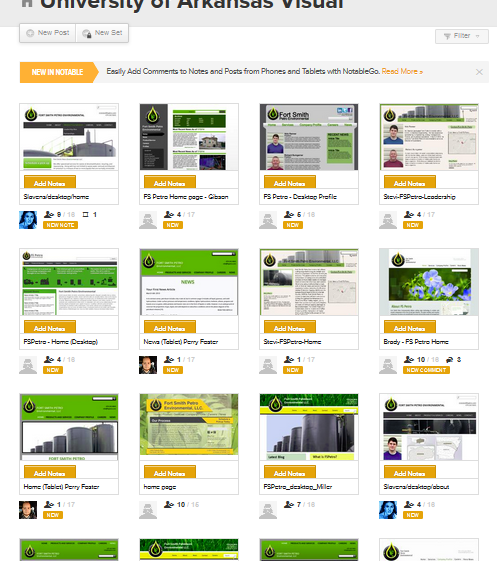Your cart is currently empty!

Website Content Makeover
Every semester for several years, designer Tom Hapgood and I brought our classes together (virtually) to create a free website for a good cause. Tom’s web design class created the design and my writing class took on the website content, and the organization we worked with ended up with a great new website.
Each student in Tom’s class created a separate design and the “client” chose among them, but the writing classes worked together — honing student editing skills while working to complete the project.
I thought I’d share with you the step by step process of improving the website content for one of the organizations.
In this example, we were working with a recycling company. They took oil which would otherwise be dumped on the ground and recycled it into a usable product.
The company provided a paragraph of content to work with:
FSPE utilizes cutting edge technology to reclaim and recycle compressor oil for the oil and gas industry. The plant will reclaim and recycle compressor oil and provide waste oil management services for Arkansas and eastern Oklahoma. The plant claims and reclaims and recycles compressor oil using a de-emulsification process and provides waste oil management services for Arkansas and Eastern Oklahoma using methods that comply with all federal, state, and environmental regulatory bodies, including the Environmental Protection Agency (EAP) and Arkansas Department of Environmental Quality (ADEQ). FSPE receives compressor oil from companies drilling throughout the Arkansas and Oklahoma River Valley Region giving them the opportunity to properly dispose of waste oil without causing damage to the environment.
I put this up on the screen in my Comp 2 classroom.
As it happened, we had an engineering student in the class. He told us some handy things about relative viscosity so we knew what they were talking about, but the students could still see problems.
- “It’s hard to understand.”
- “It’s boring.”
- “It’s all about them.”
It was, in other words, exactly like the first draft most companies put together for their homepage content.
The writing class got to work identifying the main point: what the recycling company actually wanted people to think and do when they read the homepage. Here’s what we came up with:
- “We want oil companies to bring us their oil.”
- “For free.”
- “So it has to look like it’s good for them.”
The class fired up their laptops, tablets, and phones, and began doing some research. They made a clear statement everyone could understand about what the organization does. They came up with reasons that it would be good for oil companies to take their oil to the recyclers, and made clear statements of those points:
- FSPE reclaims and recycles compressor oil for the oil and gas industry in Arkansas and Oklahoma.
- Good things about it
- Good for the environment: recycle the oil
- Good for the oil companies: allow to dispose of oil properly
- Good for the consumers: lower costs
With the main points decided, they sorted the facts they had found into groups and chose points that would be persuasive for website visitors. They polished up their sentences and created something that would be easier and more interesting to read:
FSPE reclaims and recycles compressor oil for the oil and gas industry in Arkansas and Oklahoma. Using methods that comply with all federal, state, and environmental regulatory bodies, including the EPA and ADEQ, FSPE provides a service that’s good for everyone involved.
Good for the environment
The U.S. uses 5,000,000 gallons of compressor oil every year.
- While it takes 168 quarts of crude oil to make 2.5 quarts of high quality oil, it only takes 4 quarts of used oil to make the same amount – 42 times less.
- 98% of the crude oil we take out of the ground is lost in the refining process, but only 38% of the used oil.
- If we recycled the 5,000,000 gallons we used, we would get over 3,000,000 gallons back.
Recycling oil also saves energy. It only takes one third of the energy to purify the used oil as to refine the crude oil.
Good for the oil companies
FSPE allows the region’s oil companies to dispose of oil properly — for free. In the absence of waste management services, the oil could be dumped on the land, leading to serious consequences:
- Used compressor oil contains toxic substances such as lead and benzene.
- One half gallon of dumped oil can ruin one million gallons of drinking water – a full year’s supply for 100 people.
- Oil dumped on land reduces soil productivity, while oil in water interferes with oxygen replenishment.
Good for the consumers
Only a bit more than half of the oil used in the U.S. is recycled. Avoiding costly cleanups and expensive on-site refining lets you cut the overall costs and can pass that on to consumers. By doing your part in reclaiming and recycling oil, you also help preserve local air and water quality. The benefits to consumers are clear:
- Lower costs
- Healthy environment
- Peace of mind
This is about 300 words, a bit less than the SEO perfect number for a homepage, but we assume there’ll be other elements on the page. Notice the difference in effectiveness.
Can you do this for your own website content? Do you need to?
If you need help writing your website content, contact us. We’d love to talk with you about your needs. As professional writers, we can optimize your content for human visitors and for search engines, probably much faster and more cost-effectively than you can do it yourself.
by
Tags:

Leave a Reply